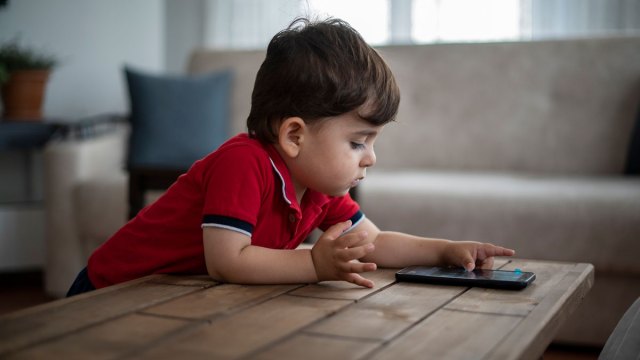It’s about time someone put ChatGPT’s AI to good use
Our first question—not our toddlers’—is what in the actual world is ChatGPT? Answer: it’s an artificial intelligence engine that’s getting all sorts of buzz for its newest generation, very adaptive and generally well-regarded ability to answer all manner of questions. And since we all know that there’s no question generator like a toddler, we figured we’d put it to the test and see how useful it might be for parents looking to ace their answer game. From taboo to tricky, scientific to silly, we took ChatGPT out for a test drive by asking it some typical toddler questions. Here’s what we thought about its answers.
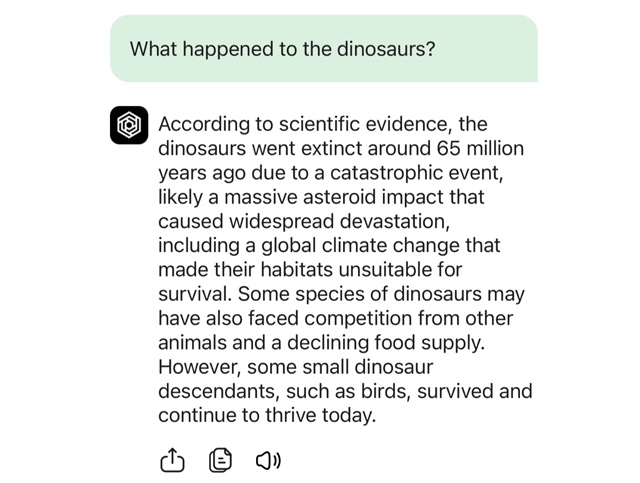
Real Parent Review
So, AI did a pretty good job here. As a real parent, here’s where the AI answer might keep our kids up at night: the “massive asteroid impact that caused widespread devastation.” That’s intense. Maybe AI could tone it down to something a little less terrifying, like “Dinosaurs went extinct waaaay before Grandma and Grandpa were born because the weather changed and dinosaurs couldn’t live in that weather anymore.” Save the asteroid impact talk for later (or for the extra curious toddler), but for your average 2- to 3-year-old, climate change—which they understand to be something similar to the change from summer to winter or spring to summer—can be reason enough without paralyzing them with fear of intergalactic impacts.

Real Parent Review
Nothing to add here, folks. Just sending gratitude out to the AI universe for someone, somewhere knowing where to go to compile this information and deliver it to us, the parents of the world who are asked to quantify universal things All. Day. Long.
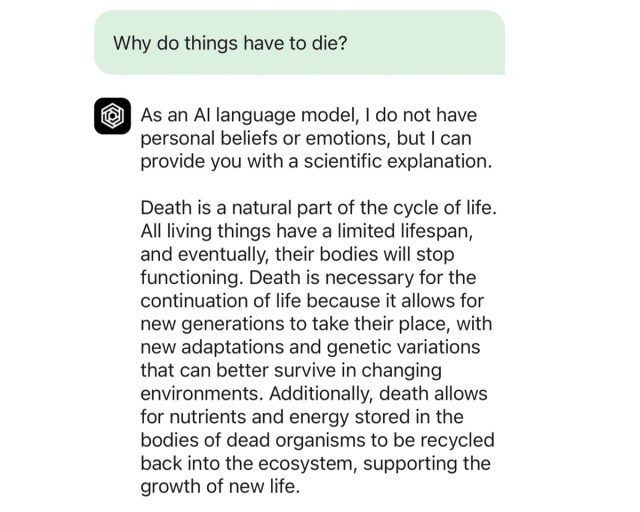
Real Parent Review
For the death of a houseplant, AI’s explanation as to why death happens is pretty great. It’s part of the life cycle of things, the decaying plant becomes nutrients for new plants, there’s more space for younger, healthier plants to join the fray. But as an explanation for why your cat, or dog, or grandparent, or neighbor had to die? Turning to AI for answers isn’t your best bet.
When you’re a toddler, a day can feel like an eternity. So when they try to grapple with the foreverness of actual death and the loss of a loved one, it’s almost impossible for them to understand. Instead of focusing on the natural life cycle and scientific angle of death, parents of toddlers find themselves trying to explain how the loved one will remain with us—in our memories, our stories, and our traditions. When a toddler loses a loved one, they don’t want to hear about regenerative cycles. But to be fair, AI has never lost a loved one, so we weren’t expecting much here.
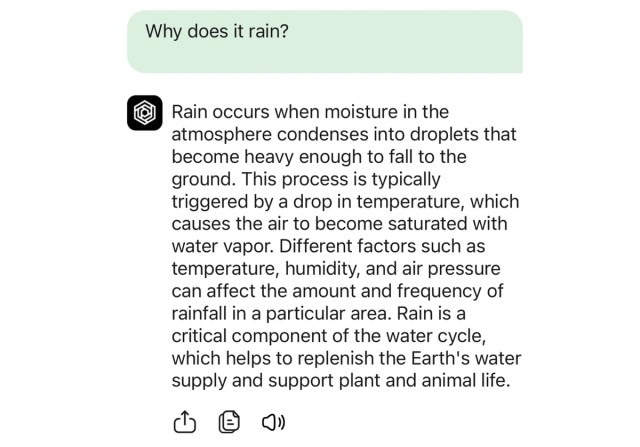
Real Parent Review
Well done, AI! It’s like you created a portal to our third-grade science class and took us right to the information we needed. You slayed this one.
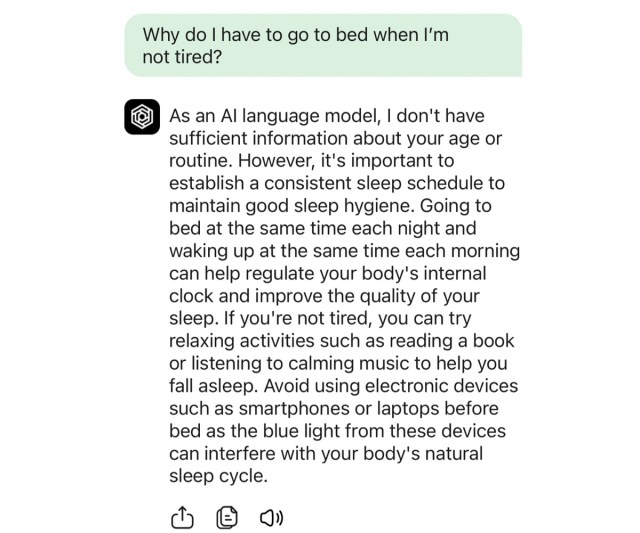
Real Parent Review
Not bad, but we’re pretty sure exactly zero tired-but-determined toddlers will accept this answer. The AI approach of explaining good sleep hygiene is pretty elevated, except our toddlers often argue against the concept of hygiene, altogether. The next angle—that going to bed and awakening at the same time will regulate your internal clock and help you sleep better—is pretty solid, except no toddler, ever, has admitted to having a bad night’s sleep. We just figure it out when they meltdown before their normal nap time. And finally, drawing attention to the fact that we’re screen-blocking them is always grounds for a fit, even if doing so is clearly the right thing to do.
Instead of following AI’s tactic, we think that the best response to “why do I have to go to bed when I’m not tired?” is one of the following:
1) Because mommy is exhausted and just wants to binge Emily in Paris (kidding...sorta).
2) Because you have had a fun, full day today and you get to have even more adventures tomorrow. It’s time for you to charge up your battery so you can have fun tomorrow, and not be tired.
3) Well, let’s see how you feel after you get snuggled up in bed and I read to you for a little while.
One thing’s certain: whatever route you decide to take, stand firm, don’t lose your patience, and remember there’s a sliver of light at the end of that bedtime tunnel.
Related: Tips for Starting (& Keeping) a Successful Bedtime Routine
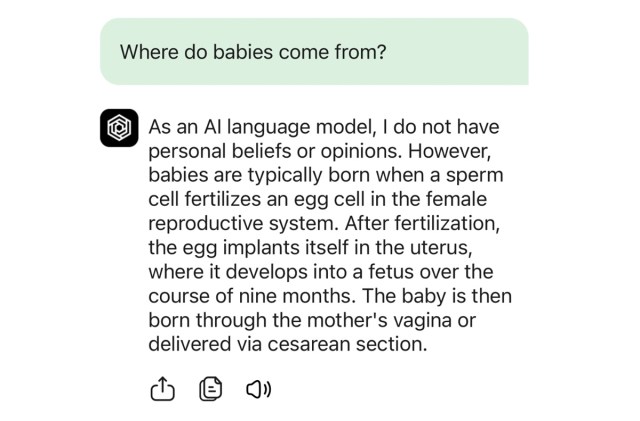
Real Parent Review
Dang, AI! You went for it. Here’s what we like: you didn’t give nicknames to private parts, you didn’t confuse us even more by inserting some fragment of a fairy tale into the narrative, and you didn’t freak out and ask us, “why are you asking about these things!?” It’s possible you could tone down the health-teacher vibe for the toddler set, and maybe explain it more along the lines of, “most living things in nature have ways to make babies, and human babies are made when a sperm fertilizes an egg." Fertilize is a big word, but it’s like saying “activate,” or “make something happen to.” You can explain that an egg by itself won’t become a baby, and a sperm by itself won’t either, but when they join forces, the egg will eventually become a human baby in about nine months.
For the most part, we think AI is on to something. Stick to science when you get questions about the human hardware and reproductive systems, and remember to address the difference between making babies and creating families sometime down the line.
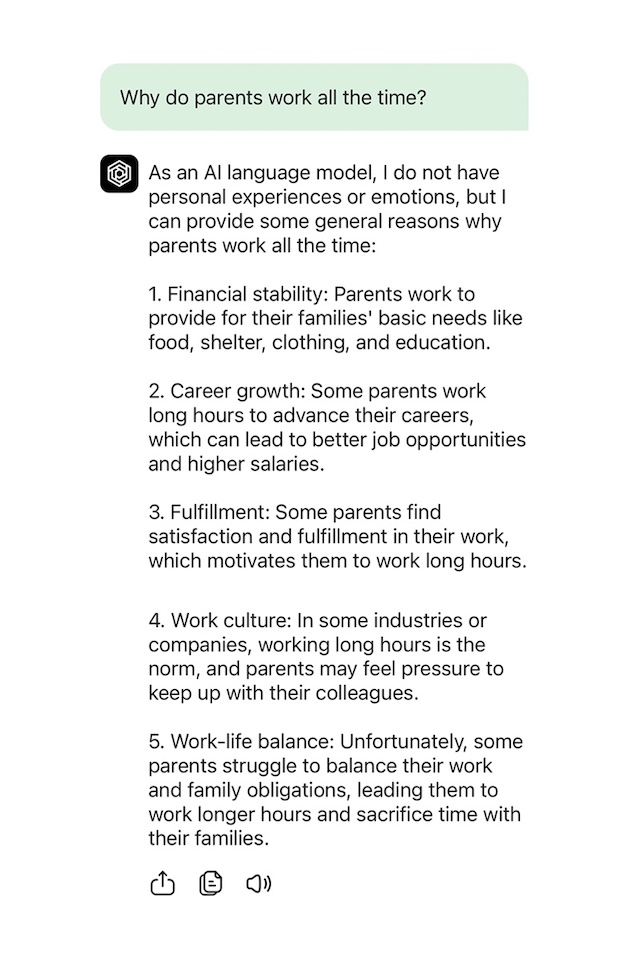
Real Parent Review
Nice job, AI. You seem to have covered all the bases here. The only thing we might point out is the glaring elimination of household work that AI just dropped on its list of work scenarios. But to be fair, AI isn’t the only one in our culture who seems to forget that parents are working for income and then working to run an organized household, too.
Toddlers know that parents have jobs, but they also see them working like crazy to get dinner ready, clothes washed, uniforms found, lawns mowed, floors swept, sheets changed, pets fed, groceries put away, and on, and on. Work, through the eyes of a toddler, isn’t just a parent’s 9-5. If you decide to take a page out of the AI playbook on this answer, just remember to remind them that adults work to make life go smoothly at home, too.
Related: 7-Year-Old's Heartbreaking Drawing Illustrates the Struggle All WFH Parents Face
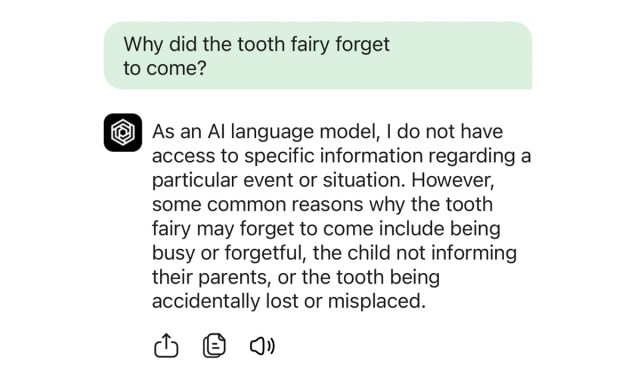
Real Parent Review
So turns out, AI is pretty savvy. We think we’ll keep it.
The Bottom Line
We wouldn’t turn our toddlers loose with Siri and ChatGPT—no big surprise there. However, ChatGPT has definitely earned a spot in our App list for its concise answers and ease of use. It just might be the Cliff Notes version of parental knowledge we’ve all been waiting on. Just remember, Cliff Notes were ever only good for getting the big picture of something, and they rarely resulted in an A on a test.
Need some fresh ideas?
Subscribe to our weekly newsletter for expert parenting tips and simple solutions that make life instantly better.
By subscribing you agree to Tinybeans Terms and Privacy Policy
